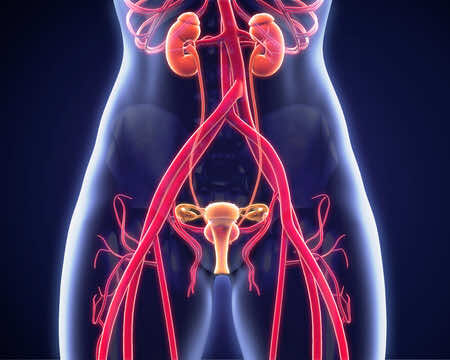EVERYTHING YOU NEED TO KNOW ABOUT UTIS
Urinary Tract Infections
Urinary Tract Infections (UTI) are a common condition, affecting the bladder and kidneys, as well as the canals connecting them. They are more prevalent amongst women, some of whom may experience recurrent UTIs. Approximately one third of all women have had a Urinary Tract Infection by 24 years of age, and one in two women have had at least one UTI in their lifetime.
UTIs usually only last a few days and are easily treated with a short course of antibiotics, available at any of our clinics.
What are the Symptoms of a UTI?
UTIs can present with an array of symptoms, or be completely asymptomatic and only diagnosed on routine testing of your urine.
Lower UTIs:
- Infections of the bladder (cystitis) or urethra
- More common than upper UTI's, and usually less serious
- Cause the following symptoms:
- The need to urinate more frequently or suddenly than usual
- The feeling of being unable to completely empty your bladder
- Pain:
- When urinating - burning
- In your lower tummy area
- Cloudy, foul-smelling urine
- May contain blood
- Feeling generally poorly, achy and fatigued
Upper UTI's:
- Infection of the kidneys or tubes connecting the kidneys and bladder (ureters)
- More severe than lower UTI's
- Can cause the same symptoms as lower UTI's
- Could lead to kidney damage or spread to the bloodstream if left untreated
- Upper UTI's an also cause the following symptoms:
- Fever of 38°C or above
- Pain of your sides or back
- Shivering and chills
- Nausea
- Confusion (particularly in the elderly)
- Anxiety, irritability or restlessness
Causes and Risk Factors of UTI's
UTI's are usually caused by bacteria: most UTIs are due to E.coli infection - a very common bacteria found naturally in the gut. Other bacteria sometimes responsible for UTI infections are Staphylococci and Enterococci.
In the majority of cases, it is gut bacteria which enter the urinary tract through the urethra (tube exiting the bladder). This can occur due to a variety of causes, such as a bad wiping technique after using the loo (wiping from back to front brings the bacteria forwards!), or during sex.
You are at increased risk of developing a UTI if:
- You already suffer from conditions which block your urinary tract, e.g. kidney stones
- You have difficulty fully emptying your bladder
- You use a contraceptive diaphragm or spermicide-coated condoms
- You have diabetes
- You are pregnant
- Recurrent UTI's run in the family (genetic risk)
- You have a weakened immune system, e.g. from HIV
- You have a urinary catheter attached (tube used to drain urine from your bladder)
- You have an enlarged prostate gland (in men)
Women are at a higher risk of developing UTIs as their urethra is shorter and closer to their back passage.
UTI Treatment
The usual treatment for UTIs involves a short course of antibiotics. Most women are given a three-day course, men are given a seven-day course. However, pregnant women and patients with more severe symptoms may require longer courses.
Your symptoms are likely to subside after 3-5 days of treatment, but it is still important to complete your whole course of prescribed antibiotics, irrespective of your symptoms improving. Painkillers such as paracetamol or ibuprofen can aid with pain relief, if needed. Drinking lot of fluids can also benefit your recovery - helping to flush out the nasty bacteria!
It is advisable to seek help from your GP again if your symptoms do not improve, worsen, or return after finishing your treatment.

Antibiotics, painkillers and plenty of fluids is the best course of treatment for UTI's.
Prevention
If you're unfortunate enough to suffer from regular urinary tract infections, here are a few tips to help prevent infection recurrence:
- Avoid using scented bubble baths or soap around the genitals; use unperfumed versions, and shower instead of bathing!
- Go to the toilet immediately after you feel the need to - and make sure to completely empty your bladder (do not hold urine in that can be expelled!)
- Drink plenty of fluids and stay well hydrated
- Wipe your bottom from front to back after going to the toilet
- Empty your bladder at the earliest opportunity after having sex
- Avoid using condoms with spermicidal coating
- Wear cotton underwear, as opposed to underwear made from synthetic materials such as Nylon
- Avoid tight trousers
If these methods do not help, and you suffer from recurrent urinary tract infections, do book in for a 15-minute consultation with one of our Private GP's at Doctors Clinic Group. Together with our Private Doctor, you can discuss a long-term solution to manage the problem, such as a low dose long-term course of antibiotics, or providing antibiotic prescription to take as soon as your classic UTI symptoms begin.
Drinking cranberry juice and pro-biotics are thought to help prevent UTI's.

Diagram of the urinary tract system
When to see your GP
If you think you're suffering with classic UTI symptoms such as pain when peeing, it's a good idea to consult one of our GPs at Doctors Clinic Group. It's especially recommended if:
- You’re exhibiting symptoms of an upper UTI
- Your symptoms are intense or worsening
- There’s been no improvement in your symptoms following a few days
- You suffer from regular UTI's
Your convenient Private GP will probably test a sample of your urine to confirm the UTI, and prescribe antibiotics if needed. Depending on how unwell you're feeling, and any other symptoms, the GP may recommend another blood test, to rule out any other causes.
Upon completing your full course of antibiotics, you'll hopefully be feeling as good as new! Successful antibiotic treatment will prevent the bacteria spreading elsewhere in the body, and potentially causing more damage. Very rarely, a UTI can persist, despite correct antibiotic administration - in these cases, it's worth popping back into one of our clinics for a follow-up consultation, to further investigate the issue.
